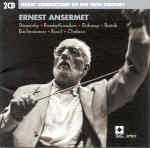The Ernest Ansermet volume is one of the best of EMI’s Great Conductors series. It includes terrific, well-chosen performances, only a pair of which are clearly bested by the competition. Those are the Bartók Concerto for Orchestra and Rachmaninov’s Isle of the Dead. Just about everybody’s had a shot at the Bartók, so Ansermet’s version with a less-than-virtuoso orchestra and a tendency toward understatement is at a disadvantage when set against the idiomatic Bartók of Dorati (Philips), the warmth and personal flair of Bernstein (Sony), and the mysteries of Kubelik (Orfeo). The night music of the Elegia movement is played more for color than foreboding and the trombone Bronx cheers in the Intermezzo never have sounded so matter of fact as here. So in a market crowded with excellent versions, Ansermet’s very good one doesn’t finish in the money.
Ditto for the Rachmaninov, where the objectivity that served him so well in modern music and the flair for color he exhibited in the Russian repertoire don’t quite bring out the deep darkness of Rachmaninov’s brooding score. Those lapping waves that run through it could be from Beethoven’s Brook in the Pastorale Symphony rather than Rachmaninov’s River Styx. And, as in the Bartók, the typically French timbre of the orchestra tends to work against the grain of the music. Reiner (RCA), Ashkenazy (Decca), and Rachmaninov himself (RCA) come closer to the mark. Ansermet’s are fine performances that just miss the top rank.
Everything else in this set gets a clear, resounding 10 for performance. Ansermet long championed Stravinsky, and his version of the Chant du Rossignol rivals Reiner’s classic Chicago version; and in its color, inner detail, and boldly projected rhythms it beats out Stravinsky’s own recording of the complete opera from which it derives. The 1956 stereo sound here is absolutely amazing in its transparency and vivid presence, a tribute to Decca’s engineers of the period.
Scheherazade was another Ansermet specialty that suited his flair for color and clarity of instrumental lines. He recorded it three times; this is his second, the fruits of Decca’s first Paris stereo recording sessions in 1954. Despite the date, the sound remains remarkably good and Ansermet captures all the moods and colors of the work, from the tensions of the outer movements to the rich vein of languorous Orientalisms that are found throughout. I especially like the contrasts of the third movement, The Young Prince and the Young Princess, where he brings out the sweet tenderness of the opening and clearly delineates the ravishing wind decorations that act as halos for the strings. The quiet, percussion-punctuated march-like section that follows is brilliantly projected and Ansermet’s solo violinist plays with an unusual degree of emotion and freedom. Scheherazade is another of those standard pieces apparently recorded by everyone with a baton, and there are many excellent versions, from Reiner (RCA) and Beecham (EMI) to recent ones such as Robert Spano’s (Telarc), but Ansermet’s 1961 recording is among the top half-dozen and this one’s as good, lacking only the full spaciousness of the later recording.
The rest of the items here are about as self-recommending as it gets–an elegant Debussy Prélude à l’après-midi d’un faune, a sparkling Ravel La Valse (which, like the Stravinsky work, he premiered), and a scintillating Fète Polonaise from Chabrier’s Le Roi malgré lui. All three are on anyone’s short list of the best performances, though the Ravel is an earlier recording than the more familiar later one. It was made in 1953 with the Paris Conservatory Orchestra and while the mono sound is good, it’s not nearly as spacious and vivid as his later version. The Chabrier is a perfect finale to the set, a bubbly reminder of Ansermet’s incomparable LP collection of that composer’s orchestral music. My only complaint, and it’s a minor piece of nit-picking, is that the selections reinforce the tendency to pigeonhole Ansermet as a Franco-Russian specialist when he encompassed a far wider repertoire that ran from Bach to Martin and included some fine Haydn and Beethoven recordings.
































